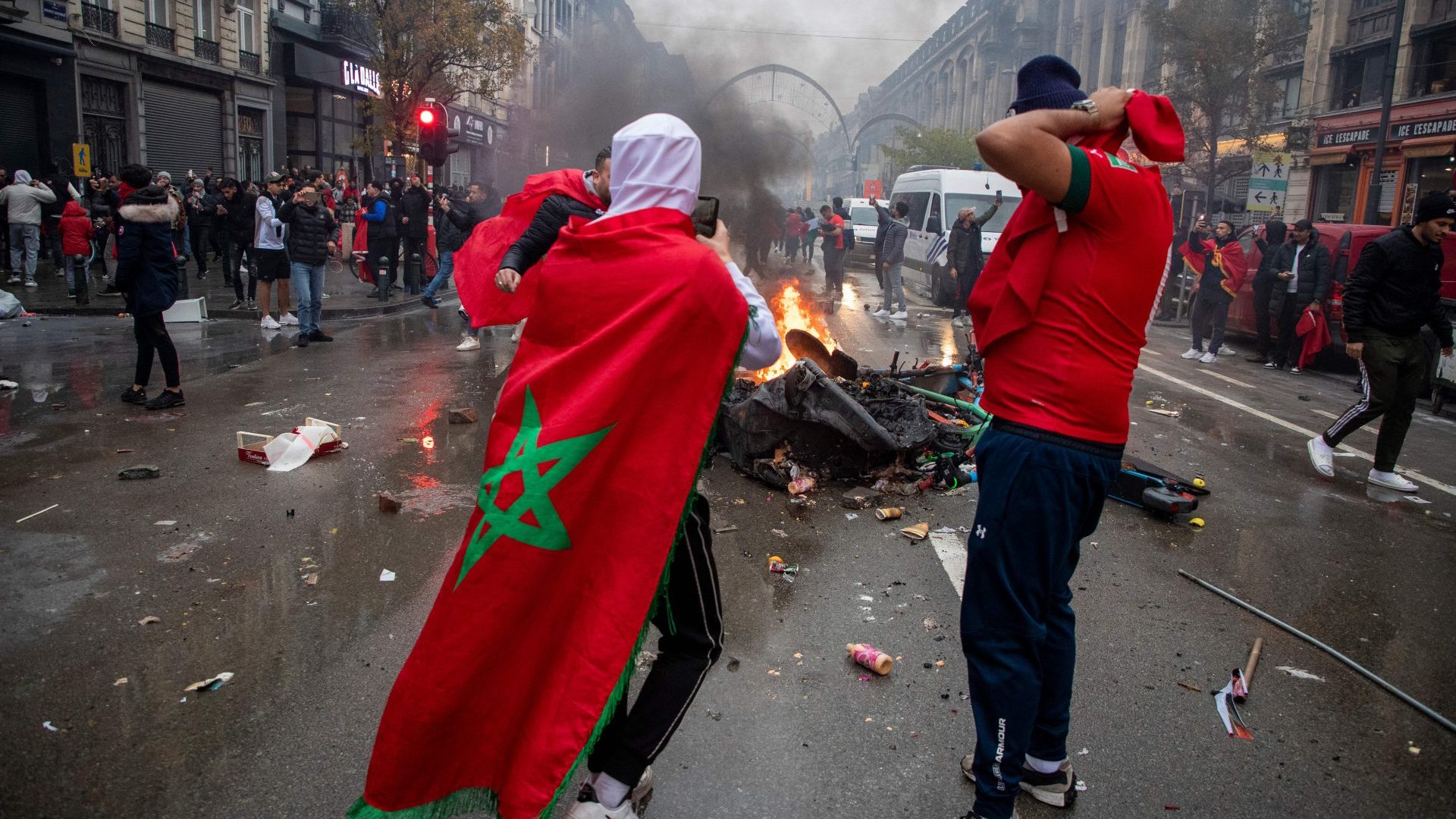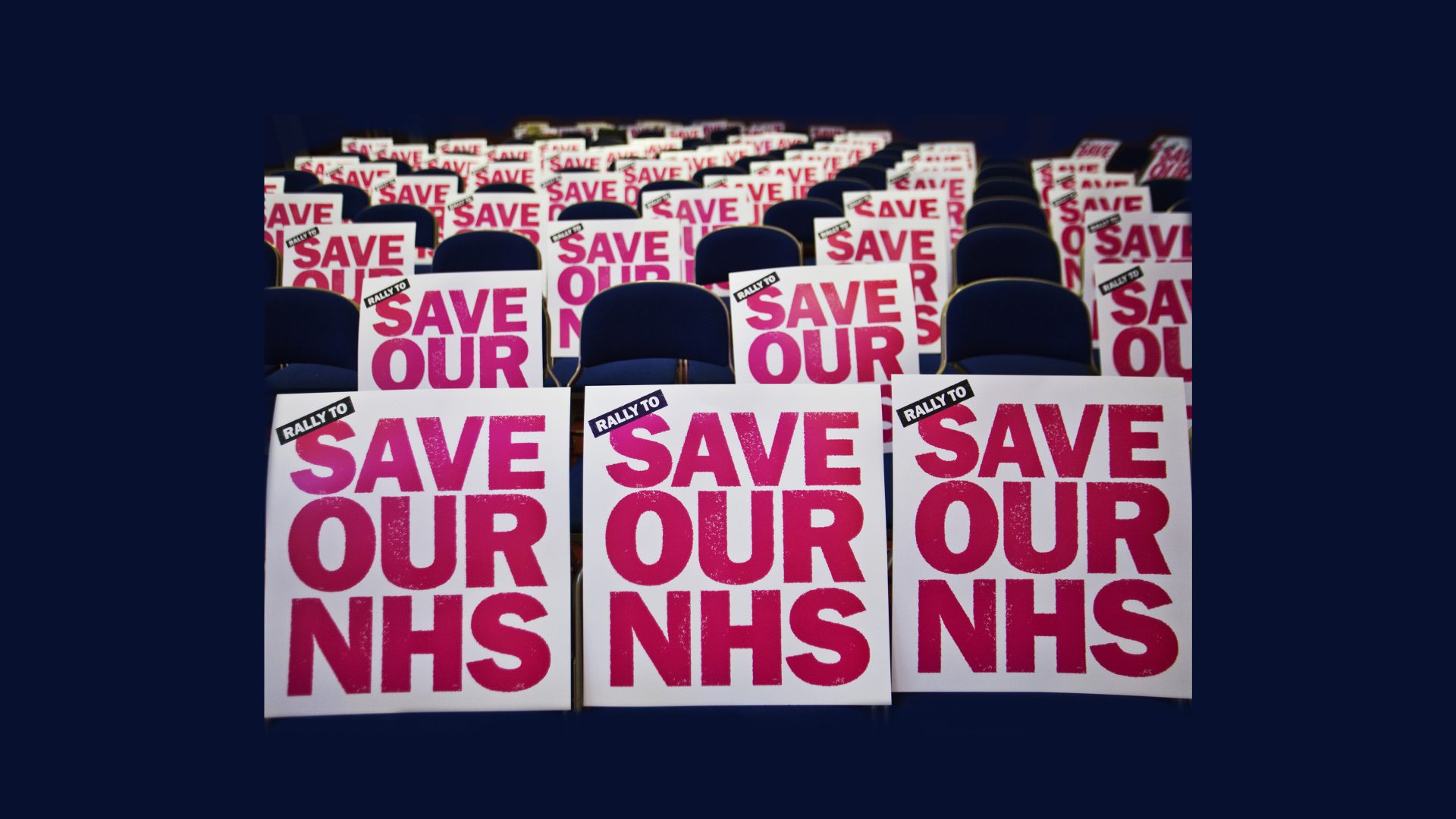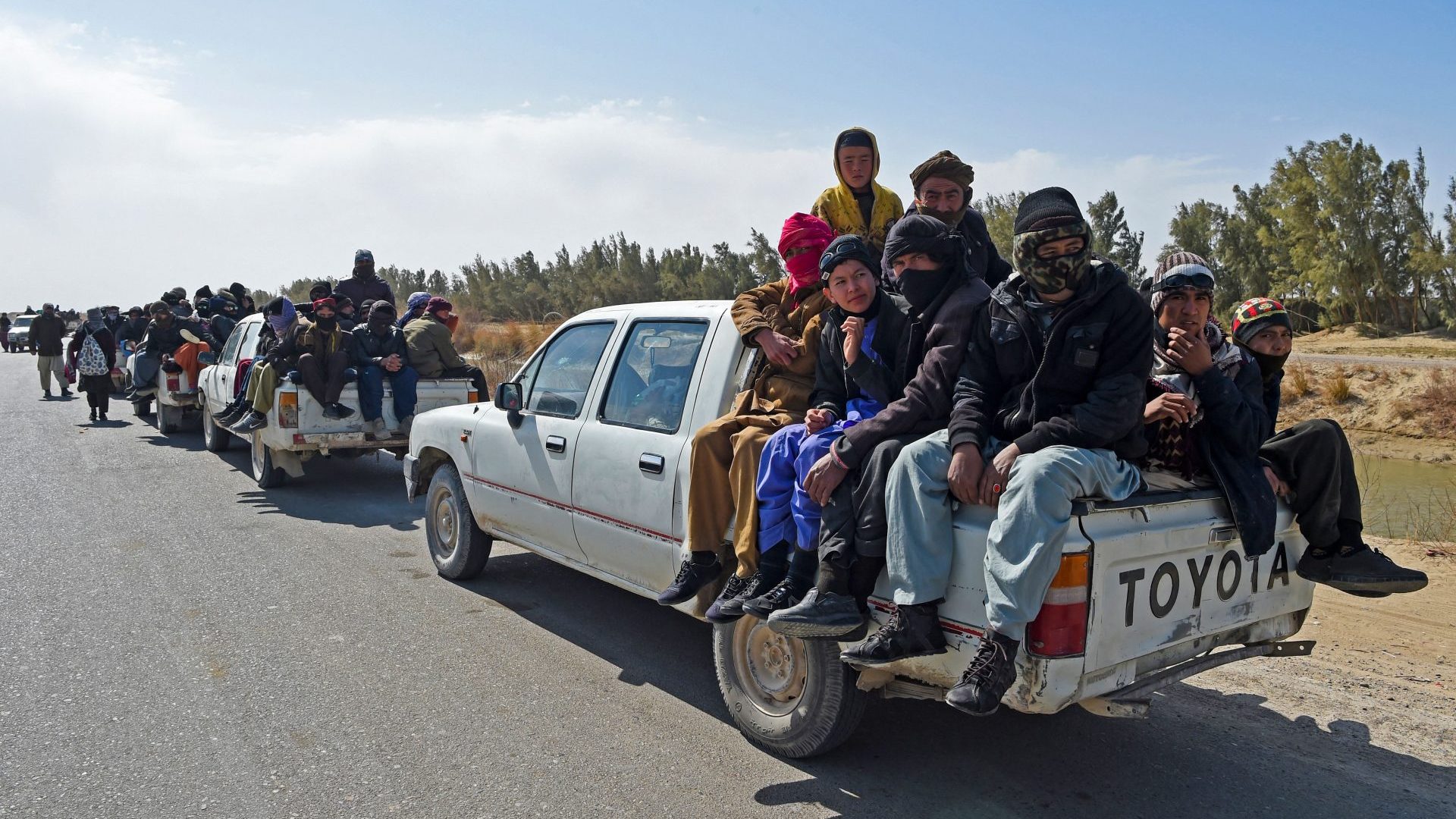We have grown used to every football match producing tens of thousands of words of analysis and opinion, and this is doubly true every four years, when the eyes of the planet turn to the World Cup. But in Belgium, it is what happened in the aftermath of the Red Devils’ 2-0 defeat to Morocco on November 27 that has generated the most noise.
The red-clad supporters of Morocco’s national team have been a good-natured presence at the World Cup in Doha. But thousands of miles away, in the cold and wet Low Countries of north-west Europe, police presence has built up around each of the country’s matches as their progress has been marked by rioting by supporters of Moroccan descent.
The build-up to the Belgium match was highly charged, with the Belgian press posing questions over the “double loyalties” of Moroccan Belgians. Then, as substitutes Abdelhamid Sabiri and Zakaria Aboukhlal scored, to deal what ultimately proved to be a fatal blow to Belgian hopes of progression, groups of Belgian youths with their faces covered started “hanging out” in the streets of Brussels, seemingly intent on trouble even as the game went on. Minutes later, as crowds of jubilant Morocco supporters streamed into the street after their upset victory, the mix turned explosive. As rival groups clashed, cars and scooters were set alight and police officers were injured before police in riot gear moved in to disperse the crowds.
The rioting also spread to other cities, notably Antwerp, and even to the Netherlands. In fact, while there was relative quiet in Belgium after the last Morocco match in the group stage against Canada – another victory – there was a repeat of rioting in Amsterdam, Rotterdam, The Hague and elsewhere. This mostly consisted of fireworks being let off, vandalism and stone-throwing.
Politicians in both countries were quick to condemn the vandalism and violence, but rather than seeing it as just another football riot, many pointed the finger at the Moroccans. Belgium’s Vlaams Belang (Flemish Interest) nationalist, anti-immigration party framed the riots as a “Moroccan problem”, while in the Netherlands the right wing firebrand Geert Wilders, leader of the anti-Islam PVV party, tweeted: “Away with the Moroccan rioters,” demanding their expulsion from the country.
Apart from these usual suspects, reactions from traditionally more moderate parties indicate that the electoral tectonic plates have shifted and that a harsher attitude towards groups of immigrant descent is becoming commonplace, at least in politics. The centre-right Belgium Christian Democrats, CD&V, spoke of “people who refuse to inscribe themselves in our society”. Even members of the Walloon and Flemish socialist parties used terms such as “scum” and spoke of the need to “clean up” some neighbourhoods.
The political reactions have been notable, says Marc Swyngedouw, a sociologist at Belgium’s Catholic University Leuven, who has done research into previous clashes between the police and youth with an ethnic minority background. “When football hooligans riot, politicians often issue condemnations. The big difference here is that it’s being linked to ethnic background. That doesn’t happen when Flemish or Walloon hooligans riot,” he said. Swyngedouw, like other researchers, emphasises that it’s usually just a small group of rioters responsible for things getting out of hand.
But it’s a fine line to walk. On the one hand, both academics looking at the background of the riots and people of Moroccan descent themselves say that this should be primarily seen as a football riot. On the other hand, almost unanimously, they talk of the racism in the Belgian and Dutch societies that expresses itself in well-documented discrimination in the job market, housing, ethnic profiling by police and even, as was shown not long ago in the Netherlands, the tax authorities. People of Moroccan descent are over-represented among the poorest segment of society and in disadvantaged neighbourhoods, which breeds frustration and resentment.
Abdessamad Bouabid, a criminologist at Rotterdam’s Erasmus University School of Law, says Moroccans are getting a particularly bad rap. “Moroccans are on the lowest rung of the ladder of acceptance. There is a kind of moral panic about Moroccans and much less about, for example, people from a Turkish background.” Looking at crime rates, he says that the differences are not that large, even though people of Moroccan descent are more over-represented than those of Turkish descent. But in the vicious circle of discrimination and disadvantage, it is hard to know what to attribute that to.
Figures from the Dutch national statistical bureau CBS bear out that the feeling of being discriminated against is highest among people of Moroccan descent. The most recent figures, from 2021, show that while well over one quarter of Turks felt discriminated against, this rose to over one third for Moroccans. In Belgium, several studies also point to systemic discrimination.
Samira Azabar, a political scientist at the University of Antwerp, acknowledges the social background of the riots. “I think there’s more going on than just football riots. It’s also those young people in disadvantaged neighbourhoods who have always heard that they have little to offer.” The Moroccan team doing well presented them with an opportunity, she says. “Now they finally have something that lifts them up, even though I doubt that they all identify 100% with Morocco.”
The focus by many media outlets on the question of double nationality and thus divided loyalties in the run-up to the Belgium-Morocco match was misdirected, she says. Many of those of the third and fourth generation born in Belgium have few actual ties with Morocco. The Moroccan national team, on the other hand, includes many players like themselves, born abroad and with dual nationality. “They come from the Netherlands, these players such as Ziyech and Amrabat. So there are a lot of players these young people can identify with.”
Her colleague at Antwerp University, Ruud Wouters, who looked at group dynamics in political manifestations that get out of hand – for example the coronavirus lockdown demonstrations earlier this year – cautions that we should not read too much of a political message into the riots.
He said: “The big difference is that one set of riots started from a demonstration with a political message, against lockdowns etc. But here this was not the case. Nobody has come forward as a spokesperson of some kind of movement. That makes it look more as though this was just for kicks.”
What the Covid riots might have in common with the recent football riots, though, is that both turned into general outbursts against the established order. This was not two groups of football supporters going at it. A similar mechanism may have been at work during the riots in Malmö and elsewhere in Sweden in April. In that case, there seems to have been a particular build-up of resentment against the police among immigrant groups.
While the riots in the Netherlands and Belgium were not particularly aimed at the police, the bad relationship between the migrant communities and some of the forces, particularly in Brussels, could have played a role, says Swyngedouw of Leuven University: “That fight between ethnic minority youngsters and the police is very present. The police are white, there is no diversity in the forces. Plus, in Brussels, many officers are from elsewhere and they don’t know the Brussels contexts and have not before worked with ethnic minorities.” On the other hand, he, like other researchers, dismisses the idea of no-go zones in Belgium. “I know of no neighbourhood where the police are not present.”
Migration has posed challenges to almost every European country, and racism and discrimination persist to smaller or larger degrees. “Guest workers” started coming to Belgium and the Netherlands in large numbers both from Morocco and Turkey in the 1960s. Their descendants have been in these countries for generations, but that does not mean they’ve been accepted. Among a population that is approaching 18 million, there are now around 420,000 Moroccans, of whom 60% are born in the Netherlands, according to the CBS. Belgium doesn’t record ethnicity, but estimates are of around 430,000 Moroccans in a population that is approaching 13 million.
Bouabid, the criminologist, says: “Why I’m speaking out at this point is because there was a lot of talk of a cultural explanation for the riots. Especially in Belgium and the Netherlands, these are very popular and mainstream explanations, while in other countries that’s seen as just racism.”
The causality between racism and criminal behaviour is fuzzy at best, says Bouabid, and many youths he talked to seem to use it merely as a justification for behaviour that is commonly encountered in criminology. But he does believe the harsh public discourse in Belgium and the Netherlands is damaging. “I’m convinced that the public discourse has an impact on society and also on minorities. That also becomes clear in my thesis. Here in the Netherlands after 9/11 there has been a sea-change in the public discourse. In the 1970s and 80s you were not able to link social problems to ethnicity. Now it’s the norm.”
These changes are looked upon with dismay by an older generation of people with a migrant background. They say that it has contributed to the younger generations “not giving a damn” and not listening to anyone any more. “If this society doesn’t want to accept us, we’ll behave that way, the way they think Moroccans behave,” is how Brahim Bourzik, editor of the Moslimkrant (Muslim newspaper) describes the younger generations’ thinking.
While he emphasises that he doesn’t approve of violence, he says some reactions were exaggerated. “I was at the celebrations in Rotterdam after Morocco-Canada. There were so-called disturbances, but what were they? It started with a huge traffic jam in the centre of Rotterdam and lots of people honking and waving flags. People call that a riot?”
Wouters echoes this and points out that it’s common for Moroccans and Turks occasionally to drive around honking when there’s something to celebrate. “I can imagine that people who have trouble with the changing makeup of society take offence and that they use it to confirm their own prejudices about how different these groups are,” he said.
Bourzik says he and his cohort used to be more upbeat about the chances of fitting in. But for many younger people of migrant descent, that has changed. “There used to be a lot of community organisations that my generation used to participate in but their budgets have been cut and they’ve mostly disappeared. In any case, the kids look at those organisations and say, what did they achieve? Nothing.”
Ferry Biedermann is a journalist based in Amsterdam writing on Europe, the Netherlands and Brexit



